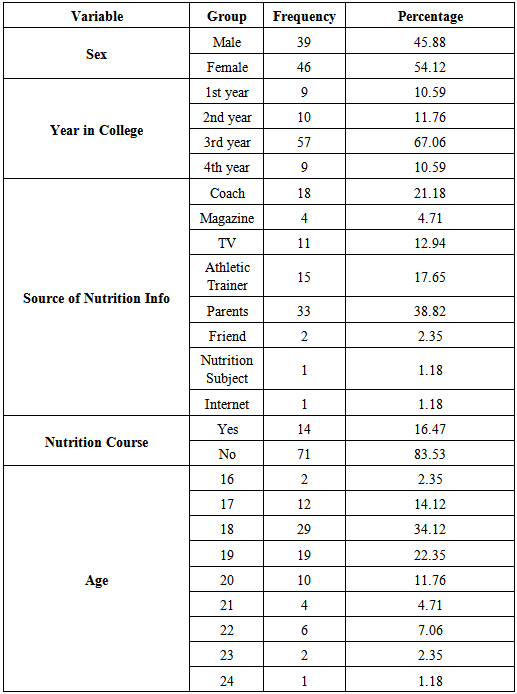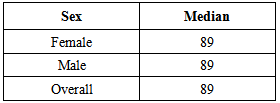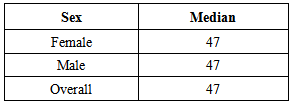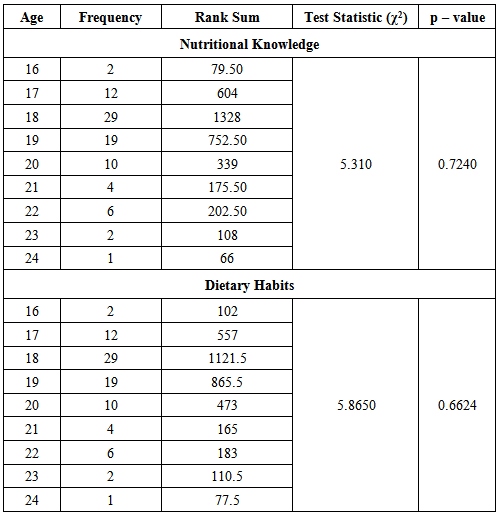-
Paper Information
- Paper Submission
-
Journal Information
- About This Journal
- Editorial Board
- Current Issue
- Archive
- Author Guidelines
- Contact Us
International Journal of Sports Science
p-ISSN: 2169-8759 e-ISSN: 2169-8791
2015; 5(2): 45-50
doi:10.5923/j.sports.20150502.01
Nutritional Knowledge and Dietary Habits of Philippine Collegiate Athletes
Rona C. Montecalbo , Rowena C. Cardenas
Department of Human Kinetics, College of Arts and Sciences, University of the Philippines Los Baños, Philippines
Correspondence to: Rona C. Montecalbo , Department of Human Kinetics, College of Arts and Sciences, University of the Philippines Los Baños, Philippines.
| Email: |  |
Copyright © 2015 Scientific & Academic Publishing. All Rights Reserved.
Athletes who have the knowledge and understanding of how they eat and what they eat and reflect this knowledge to their total daily needs and athletic performances are considered to be more successful in their sports life. The purpose of this study was to examine the relationship between nutritional knowledge and dietary habits of Philippine collegiate athletes allowing comparison for age and gender. Eighty-five athlete-respondents from the University of the Philippines Los Baños (UPLB) and Polytechnic University of the Philippines (PUP) were randomly selected. Descriptive survey research design was adopted in the study. The Pearson’s Correlation Coefficient and Kruskal-Wallis test for equality of population was also used to test the hypotheses. Results revealed that more female athletes (4%) showed poor level of nutritional knowledge compared to no one of the male athletes. No reliable difference was found for both age and gender of the athlete-respondents in terms of nutritional knowledge and dietary habits. There was a significant relationship between nutritional knowledge and dietary habits of the athlete-respondents (r = 0.3483 and p-value equal to 0.0011) thus, athletes who have higher level of nutritional knowledge also have better dietary habits. As a result, researchers have suggested that there is a need to continuously promote the importance of having proper nutrition information to athletes. Consultations with nutrition experts are highly recommended. Sports nutritionist of various Universities and Colleges should monitor nutrition status and dietary needs of the athletes, and it should be done throughout the year not just prior to competition.
Keywords: Philippines, Nutritional knowledge, Dietary habits, University athletes
Cite this paper: Rona C. Montecalbo , Rowena C. Cardenas , Nutritional Knowledge and Dietary Habits of Philippine Collegiate Athletes, International Journal of Sports Science, Vol. 5 No. 2, 2015, pp. 45-50. doi: 10.5923/j.sports.20150502.01.
Article Outline
1. Introduction
- Athletes can be considered as the most health conscious individuals in view of their active lifestyle due to intense training and physical demand of their respective sports [1]. However, although performance is a central focus for athletes, their nutritional knowledge and dietary habits has also an outsized contribution for their success. According to Dunn and colleagues [2] nutritional knowledge of athletes was minimal and their primary needs are the understanding and application of basic nutrition to sports activities [3]. Hence, athletes participating in sports have more problems acquiring basic nutrient needs [4]. In addition, athletes were more concerned on their body image. Montecalbo et al. [1] stated that athletes from different sports have reported some disturbance in their body image while performing and when attempting to achieve and retain a body weight and shape that allows them to stay competitive. Dixit and colleagues [5] claimed that awareness of the physical appearance and body image is an important potential predictor of nutritional status. Furthermore, information from fallacies and non-experts may cause the athlete’s confusion, misinformation, misconceptions, and misguidedness.College athletes nowadays encountered problems in terms of food preparation and food choices due to their hectic schedules between academics and athletic training. According to the study of Paugh and Ziegler et al. [6, 7], nutrient intake was influenced by factors such as lack of time, hectic training schedule and increased emphasis on physical features such as leanness and body image. An additional concern is the athlete’s knowledge needed to determine which food items to select [2]. Unreliable information obtained by the athletes contributed to the problem of making poor dietary choices [8, 9]. Kundel and colleagues [10] stated that as the athletes’ nutrition knowledge increases their nutritional quality of food choices improve.Gender differences in nutritional knowledge and dietary habits of athletes have been examined in a number of researches [2, 6, 11, 12, 13]. Findings generally revealed that female students and athletes had higher nutritional knowledge scores and have better dietary habits and eating attitudes than male. In addition, female were more concerned about their nutrition and health than their male counterpart [11]. However, numerous investigations revealed that female athletes are more likely to manifest eating disorder and symptoms than male athletes [14] and women are using more dieting behaviors than did men [15]. Particularly, females tend to use weight-loss strategies such as eating low-calorie foods and eating according to special diet. Moreover, females have higher desire for dieting and losing weight, while males want to achieve their ideal V-shaped figure and to gain additional muscles [1].An athlete who is educated with proper nutrition may obtain information to help enhance his/her athletic performance, to maintain healthy eating habits, and to avoid unhealthy eating attitudes that may further cause eating disorders. Furthermore, athletes who are well nourished are not only healthy but also capable to perform intensely and compete successfully without putting their health into risk and injury. The present study examined the relationship between nutritional knowledge and dietary habits of selected college athletes in the Philippines. Specifically, the study sought answer to the following questions: How could the nutritional knowledge and dietary habits of the athlete-respondents be described? Is there a significant difference in the nutritional knowledge and dietary habits of the athlete-respondents when grouped according to age and gender? And, is there a significant relationship between nutritional knowledge and dietary habits of the athlete-respondents?The results of this study may serve as guidelines and awareness for athletes, coaches, trainers, and sports directors of various Colleges and Universities to give emphasis on the vital role of understanding the proper nutrition that consequently influence eating habits. Sports administrators and school policy makers should include these on their intervention programs, plans and implementations.
2. Materials and Method
- A total of 85 college athlete-respondents (46 females and 39 males), aged 16-24 participated in this study. They represent seventeen different sports events, which included athletics (n = 7), arnis (n =2), badminton (n = 3), baseball (n = 7), basketball (n = 4), beach volleyball (n = 7), chess (n = 2), dancesport (n = 1), football (n = 9), futsal (n = 2), karate-do (n = 1), pepsquad (n = 3), sepak takraw (n = 7), swimming (n = 5), softball (n = 18), taekwondo (n = 1), and volleyball (n = 6). Respondents were selected college athletes from the University of the Philippines Los Baños and Polytechnic University of the Philippines Sta. Mesa, Manila, Philippines.
2.1. Nutritional Knowledge and Dietary Habits
- Nutritional knowledge and dietary habits of athletes were assessed using the dietary habits and nutritional knowledge questionnaires developed by Paugh [6] approved by the California University of Pennsylvania IRB. Nutritional knowledge consisted of 29 questions wherein respondents were asked to indicate to what extent he/she agreed with each statement. Responses were rated on a 4-point scale (4= strongly agree, 3= agree, 2= disagree, 1= strongly disagree) with higher scores indicating higher level of nutritional knowledge. Question numbers 2, 6, 8, 20 and 29 were reverse scored. It means that if the respondent answered the question with a 4, then he/she was given a score of 1 and vise-versa. The total scores of the individual athletes were then classified as follows: 99-116 = excellent, 81-98 = good, 64-80 = fair, 63 and below = poor. The dietary habits consisted of 18 questions relating to how often an individual athlete ate a particular food item. These questions also included how often an athlete consumed food from each portion of the food pyramid, as well as consumption of beverages, vitamin and mineral supplement. Food intake, dieting, and skipping meals were also examined. Responses were rated on a 4-point scale (4 = always, 5-7 days per week, 3 = often, 3-4 days per week, 2 = sometimes, 1-2 days per week, 1 = never). Question numbers 2 - 4, 8 - 9, 14 - 15 and 17 were reverse scored. The responses were summed up with higher scores indicating better eating habits.
3. Results and Discussion
3.1. Demographic Data
- The study consisted of selected thirty-nine (39) male and forty-six (46) female college athletes, age 16-24 (Table 1) from the University of the Philippines Los Baños and Polytechnic University of the Philippines Sta. Mesa, Manila, Philippines. Majority of the athlete-respondents were on their 3rd year (67%) followed by 2nd year (12%) and 1st year & 4th year (11%) level in college. The three (3) major sources of nutrition information of the athlete-respondents were from parents (39%), coach (21%), and athletic trainer (18%). Majority of the athlete-respondents (84%) has not yet taken up any nutrition courses/subjects.
|
3.2. Nutritional Knowledge of the Athlete-Respondents
- Majority of the female (63%) and male (67%) athlete-respondents showed fair level of nutritional knowledge (figures 1 & 2). However, 4% of the female athlete-respondents reported “poor” level of nutritional knowledge compared to no one of the male athlete-respondents. The result was related to Kashubeck-West and colleagues’ [15] findings that women were using more dieting behaviors and have higher desire for losing weight, and using strategies such as eating low-calorie foods, counting calories, and eating according to special diet. Furthermore, Table 2 presents the median nutritional knowledge score according to gender. Results revealed that male athlete-respondents and female athlete-respondents have equal median nutritional knowledge score. Overall mean score was 89 and was considered a fair level.
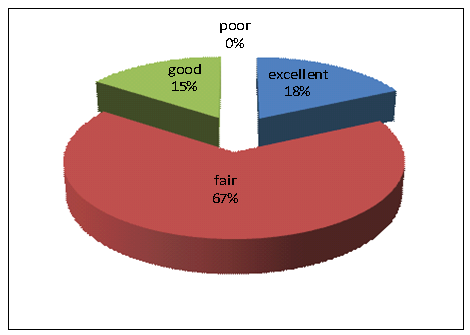 | Figure 1. Nutritional knowledge distribution (in %) of male athlete- respondents |
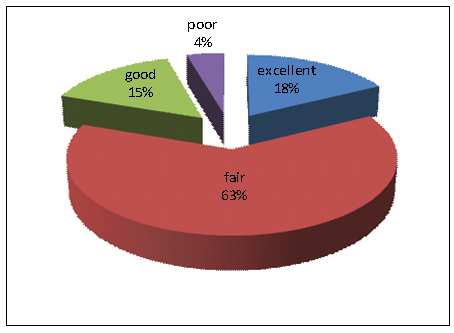 | Figure 2. Nutritional knowledge distribution (in %) of female athlete-respondents |
|
3.3. Dietary Habits of the Athlete-Respondents
- Athlete-respondents were asked about how often they ate a particular food item, how often they consumed food from each portion of the food pyramid, dieting and skipping meals. Results showed that majority of the athlete-respondents male and female (54%) reported to have eaten their breakfast 5-7 days/week (Figures 3 & 4). However, (8%) of the female athlete-respondents indicated that they never ate their breakfast. (51%) male and (50%) female reported that they skipped meals 1-2 days/week, though (3%) male and (4%) female reported that they never skipped their meals. Eating breakfast is the most important meal of the day; it serves as fuel and source of nutrient and energy needed for the athletes’ body to perform a high quality workout/training. Similarly, skipping meals can also lessen the energy supply to the muscles which further reduce the intensity of performance and increase the risk of injuries., Figures 3 and 4 further showed that there were athletes who never drunk water, ate bread, cereals, fruits, vegetables, and dairy product which are sources of carbohydrates. Carbohydrates is also known as “master fuel” for the athletes [22], it provides the major sources of fuel for exercising muscles, to control blood glucose level, and provide essential energy especially before, during, and after exercises. With all the differences in the dietary habits of male and female athlete-respondents, results of this study revealed that the mean median dietary scores of both male and female athletes were the same (Table 3). Likewise, the overall median dietary habits score of 47 was considered as fair (not too high, not too low) relative to the highest possible score of 72 for dietary habits. On the contrary, the study of Paugh [6] indicated that female athletes had significantly higher mean scores than male athletes in terms of dietary habits and male athletes lack the knowledge and habits compared to their gender counterpart.
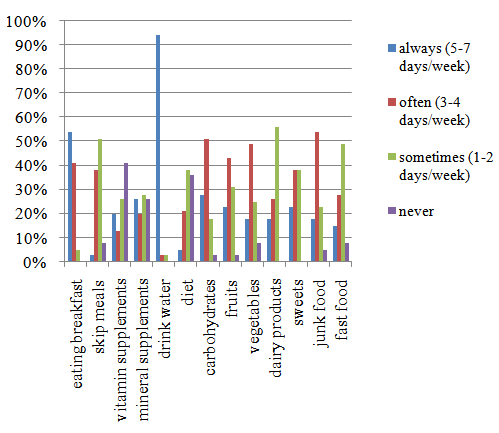 | Figure 3. Dietary habits of male athlete-respondents |
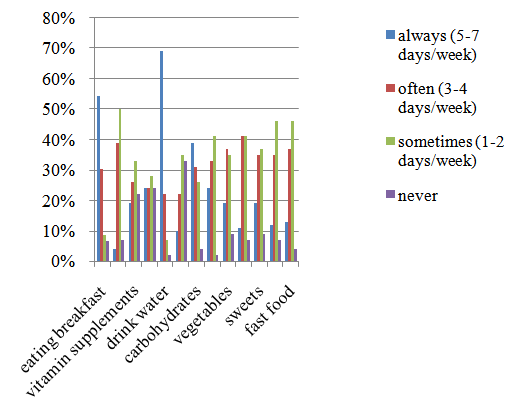 | Figure 4. Dietary habits of female athlete-respondents |
|
3.4. Differences in the Nutritional Knowledge and Dietary Habits of the Athlete-Respondents
- Table 4 & 5 presents the differences between nutritional knowledge and dietary habits of the athlete-respondents according to age and gender. Results revealed that both p – value = 0.9930 of nutritional knowledge and p – value = 0.7504 of dietary habits of male and female athlete-respondents exceeds the alpha = 10%. The p – value 0.7240 of nutritional knowledge and p – value = 0.6624 of dietary habits among different ages of the athlete-respondents also exceeds the alpha = 10%. Thus, we fail to reject the null hypotheses. Nutritional knowledge and dietary habits scores of male and female athlete-respondents among different ages do not differ significantly. Results of the present study concur with Barzegari and colleagues [23], Triches and Giugliani [24] who stated that there were no significant differences among nutritional knowledge of all majors and between age and genders. On the other hand, Webb and Beckford [21] mentioned that higher age group of 18-21 scored higher nutrition knowledge and attitudes than lower age group of 11-12.
|
|
3.5. Relationship between Nutritional Knowledge and Dietary Habits of the Athlete-Respondents
- Table 6 shows the correlation between nutritional knowledge and dietary habits together with its probability value (p - value). Results revealed that at alpha equal to 10%, there were a significant positive linear relationship between nutritional knowledge and dietary habits with correlation coefficient (r) equal r = 0.3483 and p-value equal to 0.0011. Thus, athletes who have higher level of nutritional knowledge also have better dietary habits. Results of the study supported Paugh [6] who revealed that athletes who practice better dietary habits also have a better understanding of nutrition.
|
4. Conclusions and Recommendations
- Based on the findings of this study, the following conclusions and recommendations have been developed. First, there is a need to continuously promote the importance of having proper nutrition information to athletes because what they eat and how they eat are the sources of their strength and energy needed for them to perform their daily task and responsibilities as athletes. Second, since the primary sources of nutrition information of athletes were their parents, coaches, and athletic trainers, it is important that they are knowledgeable enough to give reliable and concrete information. Consultations with nutrition experts are highly recommended. Furthermore, regularly attending any nutrition related seminars and conferences will also help keep them well-informed of the latest trends in nutrition education. Sports administrators and school policy makers should conduct a nutrition program and/or seminar workshop once every semester to keep the athletes and other students aware of the importance of proper nutrition on their daily lifestyles. Nutrition courses should be included in the curriculum of freshmen students on the 1st semester of the school year. Athletes and students who completed nutrition course/subjects have significantly higher nutrition knowledge scores and positive eating attitudes and habits [25]. Therefore, it is recommended as a requisite subject/course to be taken in the initial college year of the students and athletes as well. Sports nutritionist of various Universities and Colleges should monitor nutrition status and dietary needs of the athletes, and it should be done throughout the year not just prior to competition. Further research should be conducted to validate the results and to improve the understanding of athletes, and coaches as well.
ACKNOWLEDGEMENTS
- The authors would like to acknowledge the sports directors and coaches of the University of the Philippines Los Baños and Polytechnic University of the Philippines Sta. Mesa, Manila, Philippines for allowing the conduct of the study. The authors gratefully acknowledge the participants for the time they spent completing the questionnaires. No grant money or other financial support was received during the conduct of this study.
 Abstract
Abstract Reference
Reference Full-Text PDF
Full-Text PDF Full-text HTML
Full-text HTML